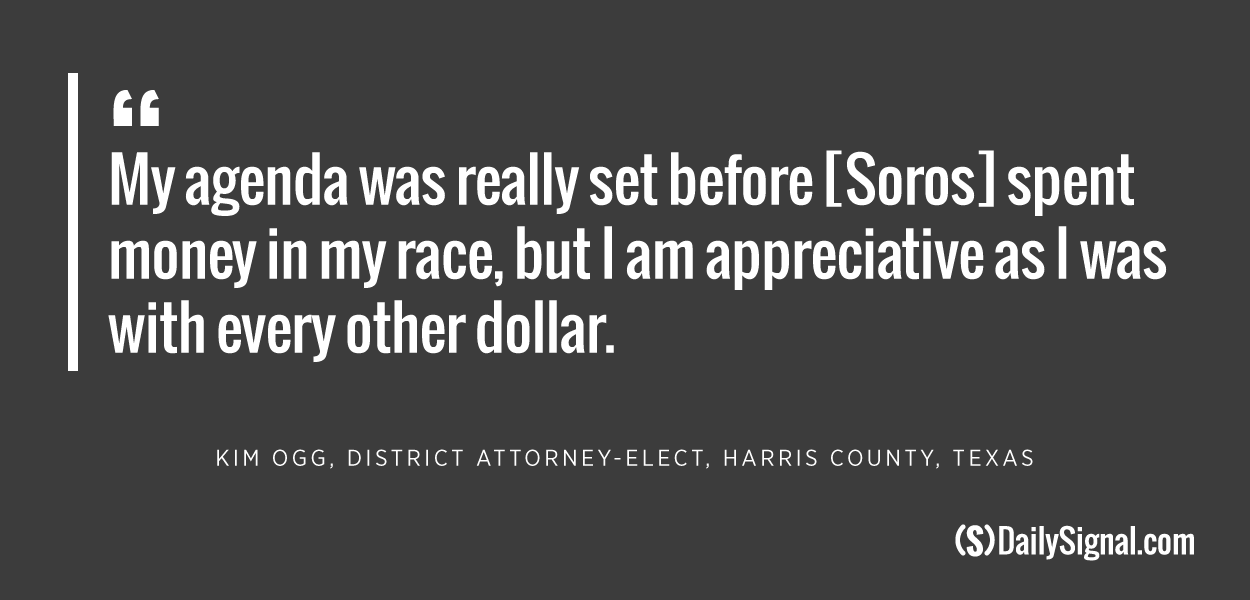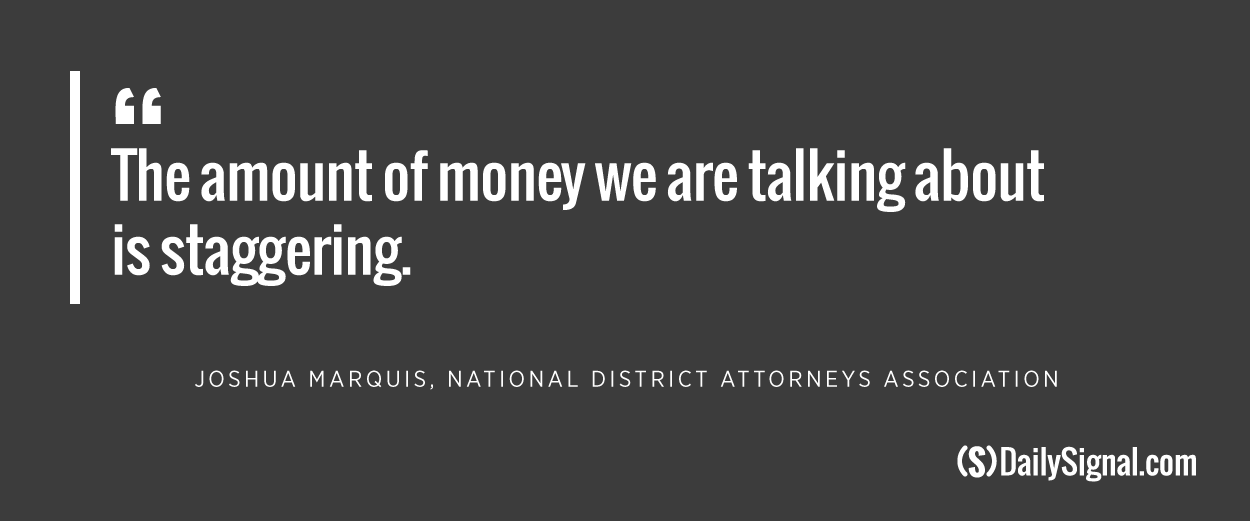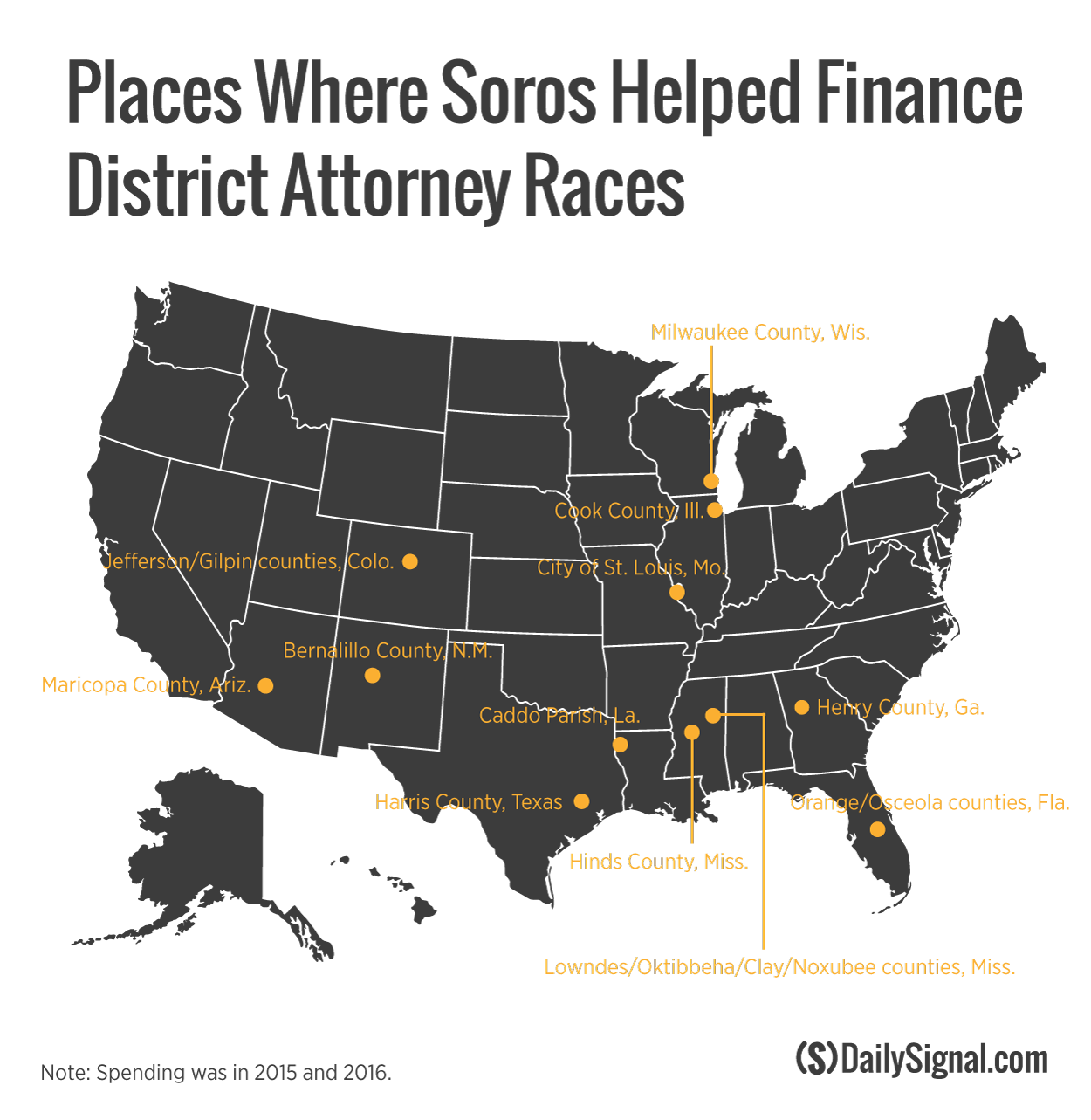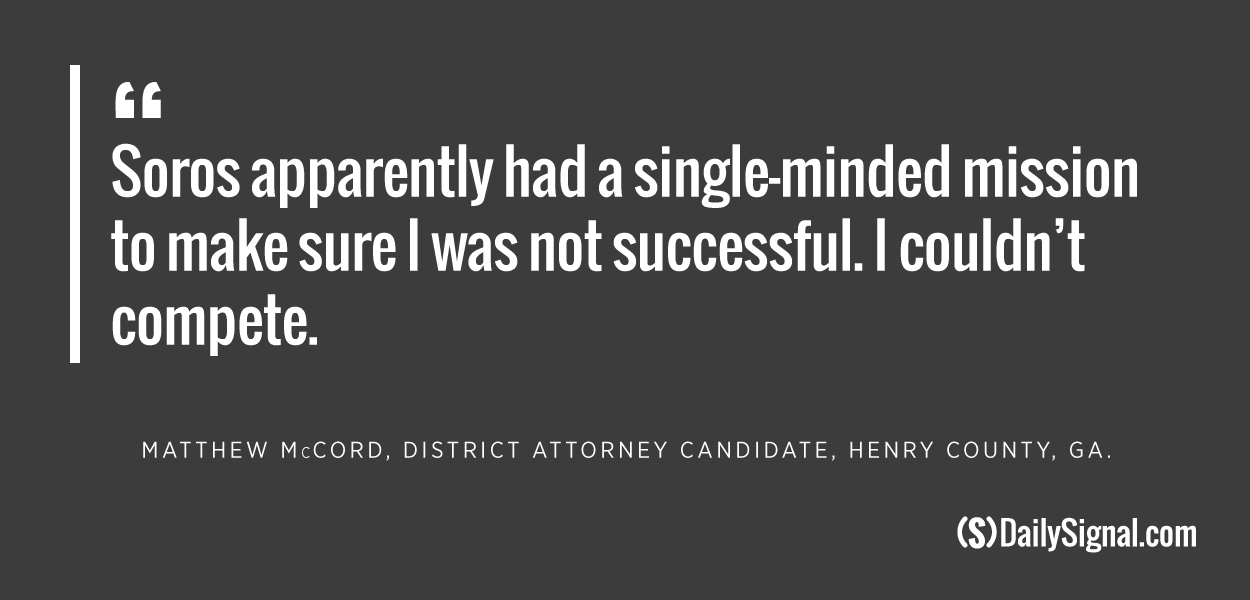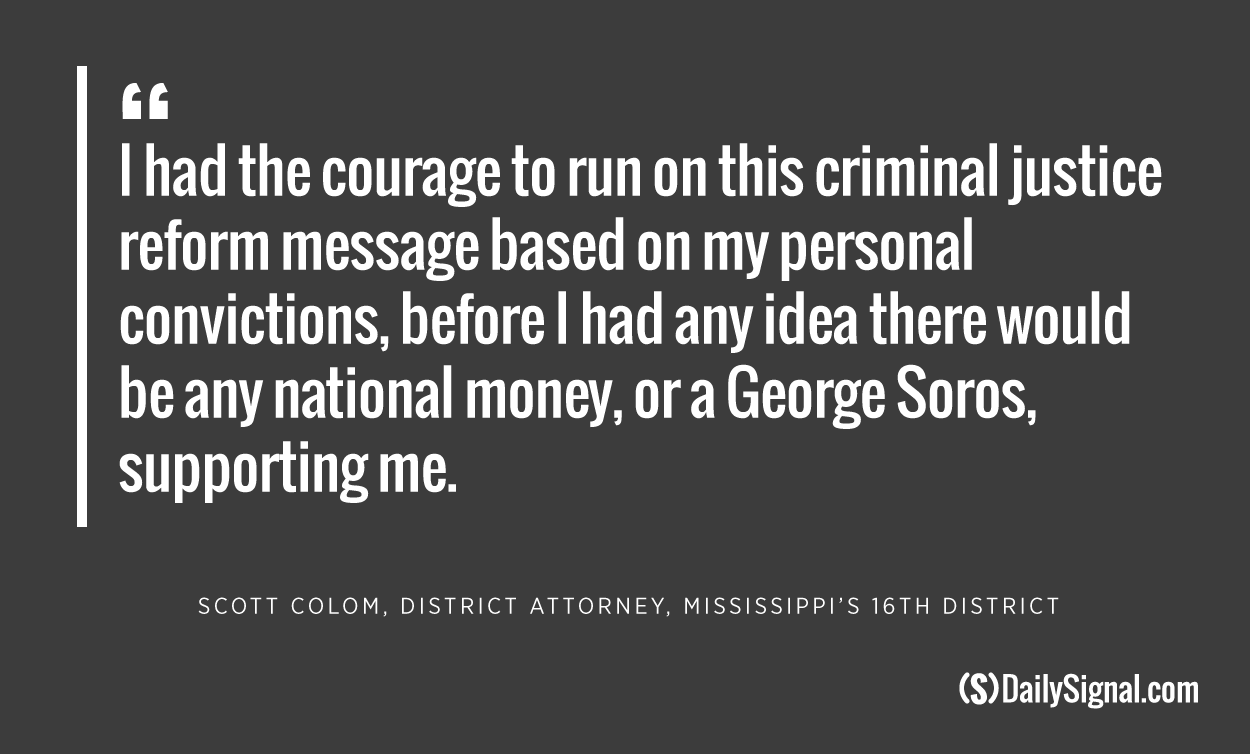The ‘Staggering’ Campaign of Liberal Billionaire George Soros to Swing Local Prosecutor Elections
Josh Siegel /
As part of his quest to overhaul the American justice system, liberal billionaire George Soros is targeting local prosecutor races like the one in Harris County, a large jurisdiction that includes the city of Houston.
Morris Overstreet, a former judge who was the first African-American elected to statewide office in Texas since Reconstruction, was one of the beneficiaries. Overstreet received $100,000 from Soros in the race for Harris County district attorney.
But in a rare lost bet for Soros, Overstreet was defeated easily in the Democratic primary in March by Kim Ogg, a white woman from a prominent political family who has practiced law in Harris County, where she was born, for nearly 30 years.
Ogg had condemned the Soros donation to Overstreet intended to defeat her, calling it “a last-minute money dump to try to buy the nomination.”
Today, Ogg is the Harris County district attorney-elect after going on to beat the Republican incumbent, Devon Anderson. She won the general election with the aid of about $878,000 from the Soros-funded Texas Safety and Justice PAC.
Soros pledged allegiance to Ogg after his preferred candidate lost.
The money helped buy television ads accusing Anderson of botching a case in which the district attorney’s office ordered a rape victim jailed to guarantee she would show up in court to testify against her attacker.
Associates of Soros helped craft the message of the ads, Ogg’s campaign confirmed to The Daily Signal. The campaign said Soros’ contributions to Ogg equaled more than half of the $1.5 million she raised in total.
This past week, less than a month before she takes office, Ogg expressed a different view of Soros’ campaign contributions.
“Before, I was dismayed he was buying the election,” Ogg said in an interview with The Daily Signal, adding:
It was a last-minute dump [of funds supporting Overstreet]. In my instance, his people came to talk to me after I won the primary, so it was not a last-minute dump. Soros is only half of the story here. My agenda and platform was really set before he spent money in my race, but I am appreciative of the money, as I was with every other dollar.
On Jan. 1, Ogg will begin to try fulfilling the vision she ran on, promising a “significant culture change” defined by taking a more lenient approach to marijuana possession cases, focusing tax dollars on punishing violent criminals, and making it easier for defendants to get out of jail on bond in a county where 70 percent of inmates cannot afford to free themselves before trial.
It’s a set of goals that would seem to match Soros’ preference for how prosecutors do their jobs, using their powerful roles and vast discretion not only to protect public safety but also reduce prison populations and repeat offenses.
Despite these overlapping interests, Ogg insists she doesn’t have a mandate from Soros. In fact, she says she’s never spoken to or met with him.
“I don’t know George Soros,” Ogg said, then repeated: “I don’t know George Soros.”
“I made no promises to Soros or his supporters. The money that helped expose issues here is always a benefit, but I believe voters made their decision not based on the name or identity of a contributor, but on the poor policies and public safety record of my opponent. Plus, I have my own reputation here. In cases of David vs. Goliath, I often represent David. I believe my reputation is intact.”
‘Staggering Amount of Money’
Soros, 86, an American hedge fund manager and philanthropist, is No. 22 on the Forbes list of the world’s billionaires, with a net worth estimated at $20 billion. He finances a variety of liberal political causes, including ones related to education, immigration, climate change, and the environment.
Soros’ philanthropic network, the Open Society Foundations, has spent more than $13 billion over the past three decades on initiatives to defend human rights abroad and shape the democratic process in Eastern Europe.
Soros gave an unprecedented $27 million to various 527 groups trying to defeat President George W. Bush in his 2004 re-election campaign, describing the effort as a “matter of life and death.”
Soros also helped launch the Democracy Alliance, a group of major liberal donors seeking to advance progressive policymaking by investing in organizations such as Center for American Progress, Media Matters for America, and Organizing for Action, which was set up to advance the agenda of President Barack Obama.
Soros has not personally spoken with or met any of the candidates he supported in district attorney races this year and last, his advisers say.
In most of the dozen prosecutor races he helped finance, Soros did not coordinate at all with the candidate he supported, they said. Instead, he operated independently by giving money to various state-level political action committees (PACs) and a national “527” unlimited-money group, each identified by a variation on “Safety and Justice.”
The form of his contributions depended on local and state campaign finance laws, Soros’ advisers say, and in some cases, as in Harris County, the collaboration was more direct.
Soros’ efforts are part of a new, broader push by progressives to locate, prepare, and fund challengers to unseat incumbent prosecutors. Such upsets are notoriously difficult to achieve in local district attorney races, where name recognition and outside interest are usually low and voters give deference to the candidate with a record.
“Criminal justice reform efforts must take many forms,” Whitney Tymas, an adviser on Soros’ project challenging sitting prosecutors, said in a statement to The Daily Signal. Tymas added:
Changing laws and redirecting funding streams is critical. Because of the enormous discretion vested in those who enforce the laws, including prosecutors, it is also important to elect officials who are committed to public safety and equal justice. These officials are a key leverage point in a complicated system.
David Alan Sklansky, a Stanford University professor and former federal prosecutor, told The Daily Signal that only a “handful” of races for the 2,500 district attorneys’ offices nationwide included candidates with “reform-oriented” agendas, and of those that did, most did not involve contributions from Soros.
“In a number of high-visibility district attorney races around the country, incumbents this year were unseated by challengers who promised a more moderate approach to criminal justice, backing away from a simple ‘tough on crime’ agenda and paying more attention to fairness, proportionality, and equity,” Sklansky said. “Many of these successful candidates also pledged to improve the investigation of police shootings, to rein in prosecutorial misconduct, and to be more vigilant in avoiding and correcting wrongful convictions.”
Still, Soros’ role in local prosecutor races is significant. It touches counties big and small, urban and rural; northern, southern, western, eastern, and midwestern. In total, Soros spent nearly $11 million on 12 district attorney races this election cycle, campaign filings show.
A Democrat candidate supported by Soros ultimately won in 10 of the 12 races.
The trend of outside funding worries opponents of Soros’ tactics, including veteran district attorneys who say the outsize contributions threaten prosecutorial independence, which is especially important in a role as powerful and all-encompassing as theirs.
“The amount of money we are talking about is staggering,” said Joshua Marquis, the district attorney of Clatsop County, Oregon, since 1994 and a board member of the National District Attorneys Association.
“And it’s amplified because it’s extremely difficult to raise money as a prosecutor,” Marquis told The Daily Signal, adding:
To ask for money when you are a prosecutor, there is something inherently icky about all of it. The argument on one side is this is good, and it’s just turning on a searchlight and looking at these issues. But that’s naive in the extreme because it’s the money that is funding debates and actual discussions. If you are able to pay for and tell your side of the story over and over again on television ads, you are going to win.
‘Couldn’t Compete’
Matthew McCord faced an uphill challenge to counter his Soros-backed opponent.
McCord, a Republican who ran for district attorney in Henry County, Georgia, was not an incumbent and did not have a prosecutor’s record to run on.
He had $60,000 in his campaign fund and a supportive family, but in September he decided that wasn’t enough. McCord dropped out of the race after learning Soros had contributed $100,000 to a political action committee supporting his opponent, Democrat Darius Pattillo.
“The joke was people were saying to me, ‘You need to fight to the death,’ and I said, ‘To whose death, mine?’” McCord told The Daily Signal in an interview. “Soros apparently had a single-minded mission to make sure I was not successful. I couldn’t compete.”
McCord, a municipal judge and local lawyer, said he ran on a platform similar to Pattillo, a deputy chief assistant district attorney in nearby DeKalb County. McCord said both candidates called for relieving overburdened courts and crowded jails by providing more alternatives to prosecution for low-risk offenders as well as better community outreach.
Pattillo did not respond to a request for an interview from The Daily Signal.
“I am viewed as a fairly centrist conservative,” McCord said. “I don’t know there was much difference between my approach to justice and his [Pattillo]. When did progressives and liberals get a monopoly on the idea of criminal justice reform? Soros doesn’t even know me. He didn’t ask me what my views were or what I would do.”
Soros so far has backed only Democrats in district attorney races, but his advisers insist his support for candidates isn’t based on political party and say Soros would consider making a large contribution to a “reform-minded” Republican prosecutor.
McCord said he doesn’t know if he will run again for district attorney—his dream job. But he said he knows what would stop him from trying.
“I’d rather be a private citizen doing the right thing than be a bought man,” McCord said.
‘A Little Bit of Love’
Prosecutors drive critical decisions in the criminal justice system, choosing when, whether, and against whom to bring criminal charges, as well as making recommendations for sentencing and setting the terms of plea negotiations.
These decisions are receiving more scrutiny at a time where there is a growing bipartisan consensus around the need to reduce incarceration, provide more alternative punishments, and expand rehabilitation opportunities for low-level drug offenders.
As part of this effort, Soros, along with progressive groups advocating racial justice and gender equality, is trying to elect more minority prosecutors in response to what he sees as an insufficient response by incumbent district attorneys to the fatal shootings of black men by police officers.
Several candidates who Soros backed are members of minority groups.
The Reflective Democracy Campaign, an arm of the progressive Women Donors Network, found in a 2015 study that 95 percent of elected local prosecutors were white.
“Of course, what was happening with Black Lives Matter and police shootings was a huge wake-up call [for progressives, who began] realizing how much power these offices have and the need for us to be focused on getting great people elected,” Andrea Dew Steele, president of Emerge America, a candidate-training organization for Democratic women, said in an interview with The Daily Signal.
“District attorney races have historically just been completely ignored, like most down-ballot races, in the progressive and Democratic community,” Steele said. “I am just thrilled to see that if you give a little bit of love to these races, a small investment yields a huge outcome.”
In Chicago’s Cook County, Soros funded one of several groups that helped Kim Foxx, who is black, defeat the incumbent state’s attorney, Anita Alvarez, in the Democratic primary. Foxx then easily beat her Republican general election opponent.
Alvarez drew widespread criticism for her handling of the 2014 fatal police shooting of Laquan McDonald, a black 17-year-old. She took 13 months before charging the Chicago police officer who shot and killed McDonald, a delay that sparked protests.
“Soros’ funding was a big factor in my loss, obviously,” Alvarez, the first female and first Hispanic candidate to be elected as Cook County’s top prosecutor, said in an interview with The Daily Signal. “Some people want to say I lost my election simply because of the McDonald video, but I felt this movement prior to my charging that officer. When you have these outside influences, it’s scary because they don’t know the climate—that Chicago has a serious violent crime problem, a serious gun problem.”
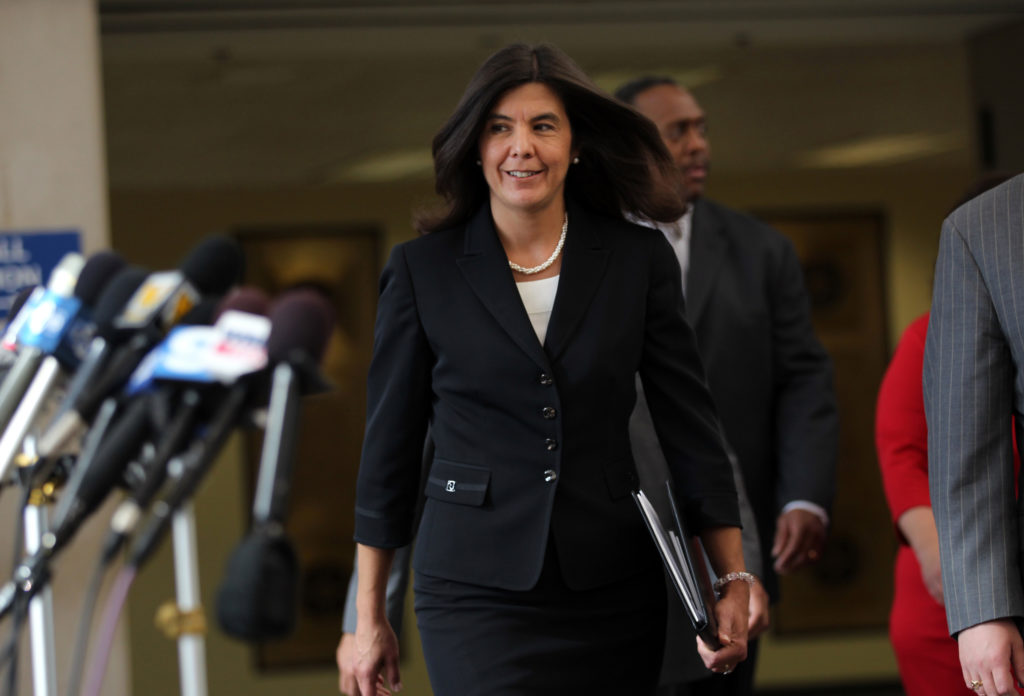
In Chicago’s Cook County, incumbent State’s Attorney Anita Alvarez was defeated by a candidate who received support from George Soros. (Photo: Abel Uribe/MCT/Newscom
Under Alvarez’s leadership, Cook County created a nationally recognized pretrial diversion program. Diversion is intended to promise low-risk defendants a second chance. Eligible individuals are not prosecuted, but instead receive supervision services such as counseling and job training, and can have their criminal record expunged.
Such diversion programs exist in almost every state, but Cook County’s is considered especially innovative because defendants pay no fee to participate, meaning poorer individuals can benefit from the services.
“It would have been a wonderful thing if George Soros actually would have looked at my record,” Alvarez said. “He probably would have liked what he saw.”
Soros’ money also helped Aramis Ayala upset incumbent Jeff Ashton in the Democratic primary for Florida state attorney for Orange and Osceola counties.
The Soros funding paid for TV ads and mailers accusing Ashton of carrying out racially disparate policies—a claim he denied.
Ayala, a black woman, became the first African-American elected as a state attorney in Florida.
“Race does not explicitly play a role, but in seeking candidates who understand the injustices of the current system, many of them turn out to be African-American or Latino, because it is people of color who have been disproportionately affected by those injustices,” Tymas, the Soros adviser, told The Daily SIgnal.
‘Couldn’t Stop Them’
Last year, Scott Colom took a risky approach to his run for district attorney in a four-county stretch in Mississippi.
Colom, who is black and a Democrat, promised voters he would promote more rehabilitation and less incarceration for drug offenders, especially young people—although he also said he’d be tough on violent criminals.
Voters validated Colom’s agenda. It also was backed by Soros, who gave almost $400,000 to a Mississippi PAC supporting Colom’s campaign to defeat a long-entrenched incumbent, Forrest Allgood, an aggressive prosecutor whose record had been heavily criticized.
That PAC also backed the re-election campaign of another local prosecutor, Hinds County District Attorney Robert Shuler Smith.
Colom now has served a year as district attorney of Mississippi’s 16th District. He has implemented some of his proposed policies, including expanding eligibility for pretrial diversion to defendants arrested for offenses such as selling marijuana.
In an interview with The Daily Signal, Colom said personal experience shapes his worldview. He grew up in Columbus, Mississippi, and watched high school classmates go to prison.
While in law school, Colom interned with the chief prosecutor for the International Criminal Tribunal for Rwanda in Arusha, Tanzania, witnessing poverty and gaining an understanding of how government policy can hold people back.
“I had the courage to run on this criminal justice reform message based on my own personal convictions, before I had any idea there would be any national money, or a George Soros, supporting me,” Colom said. “I decided to run this way having no idea on how it polled. This is how I believed I should be elected.”
Colom, like Ogg in Harris County, said he didn’t know how Soros learned about who he is and what his positions are.
Colom said he never has been in contact with Soros, or anyone associated with him—and does not plan to connect with him now. He said he learned about Soros’ contribution only after seeing and hearing television and radio ads supporting his election.
Colom said the nearly $400,000 in outside money likely helped him, but that he also raised $150,000 on his own and knocked on doors every day from 3 to 7 p.m. during campaign season.
“This was a trying experience,” Colom said. “The most difficult thing I have done was to run for this office. It is important people get the whole picture of how I ran, not just one aspect of it.”
Colom added:
I don’t know George Soros. Do I think his spending money to spread my message helped me? I think any time your message spreads to more people, that helps that candidate get their message out. But what I emphasize is, the message has to be something someone agrees with. The people agree with my message. The people understand if you can avoid sending someone to prison and avoid the scar of a felony record, you should do that.
Colom’s candidacy for attorney general in Mississippi’s 16th District was one of the first such races that Soros has supported. As the Soros effort spreads, Colom says, it’s a difficult thing for candidates to counter.
“His support is not even something I can accept or decline,” Colom said. “They spend money independent of me. I couldn’t stop them. Honestly, I wouldn’t know who to ask if I wanted them to stop.”
Overcoming ‘Radical Agenda’
Pete Weir was able to halt Soros’ momentum by winning.
Soros dedicated $1.2 million to defeat Weir, the incumbent Republican district attorney of Gilpin and Jefferson counties in suburban Colorado.
Soros contributed to a PAC running negative ads against Weir in support of Democrat challenger Jake Lilly, a former prosecutor and Iraq War veteran. One mailer said the incumbent “can’t be trusted to keep us safe from sex offenders.”
In an interview with The Daily Signal, Weir said he overcame Soros’ influence by emphasizing his 37 years of criminal justice experience. The record, he said, includes a longtime dedication to reform—the cause that Soros says he is promoting.
“There was a backlash and outrage over the negative ads directed to me and an outrage over the prospect of an East Coast billionaire trying to buy our justice system,” Weir said, adding of Soros:
He knows nothing about our community, and what the criminal justice issues are in our counties. But it didn’t change my tactics or the way we campaigned on a positive message, on my experience. What he could not overcome were the relationships we had built in the community.
Weir said he spent about $80,000 on his re-election campaign, using that money to spread the message that his office is “progressive,” combining “aggressive prosecution when it’s called for with innovative, problem-solving courts.”
Weir is a member of the Colorado Commission on Criminal and Juvenile Justice, which has helped pass state legislation reducing prison sentences for drug crimes.
He says he will continue to support reforms as prosecutor, because it’s what residents of Gilpin and Jefferson counties want. Even if he shares some of Soros’ goals, he said, those efforts should be dictated by local officials.
“It sounds immodest to say, but you would be hard-pressed to find another prosecutor in Colorado who has led reform efforts realizing we can do a better job in more areas,” Weir told The Daily Signal. “As a prosecutor community, we realize the system is imperfect and changes can and should be made. But to see some East Coast billionaire who has no idea of local interests acceding to a radical reform agenda at the expense of our democratic process is incredibly dangerous.”
‘Be More Political’
Soros and allied progressive groups say they will continue grooming and supporting prosecutor candidates who share their goals.
Steele, of Emerge America, says she already is looking ahead to the 2018 elections, with plans to recruit and train at least 25 Democratic women to run in district attorney races.
Women, she says, are uniquely sensitive to the consequences of incarceration and, as prosecutors, are likely to use their powers more carefully.
“I am hopeful that Emerge will have women running for district attorney in 2018 and make it onto Soros’ radar screen,” Steele said. “The George Soroses of the world can’t get the outcomes they desire unless you have great candidates. So what we are doing is a critical piece.”
She does not apologize for the aggressive outreach, arguing that because a state’s top prosecutors are elected, the process to become one is inherently political.
“All of these races are political,” Steele said, adding:
You have to run a race in order to win. I would say these races need to be even more political. Because the progressive community wants to see certain outcomes, less mass incarceration, that’s the outcome. In order to see that, we need to win races, and get qualified, good people running for these offices that had previously been uncontested.
Marquis, of the National District Attorneys Association, says he doesn’t doubt the sincerity of Soros and of progressive groups. He emphasizes that many members of the association, which represents state-level district attorneys across the U.S., support reform.
Indeed, the National District Attorneys Association made headlines earlier this year when it endorsed compromise legislation in Congress meant to reduce mandatory minimum sentences for low-level drug offenders in the federal prison system.
Yet Marquis said he worries that despite these efforts, some incumbent members of the association could lose their jobs to better-funded challengers.
“This is the source of great conversation among district attorneys,” Marquis said. “A lot of us are sitting around saying, ‘What if it’s me next? What if I am targeted?’”

